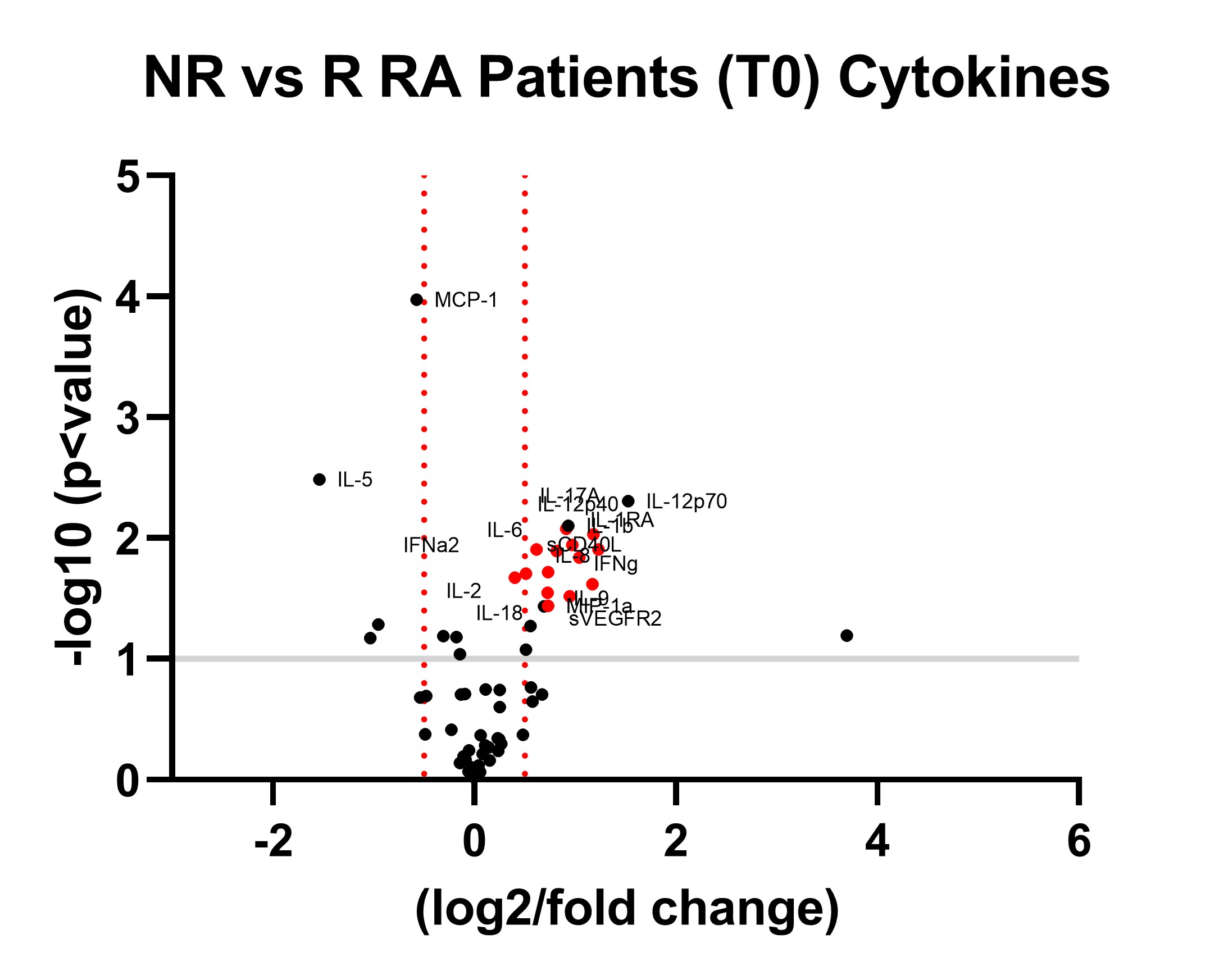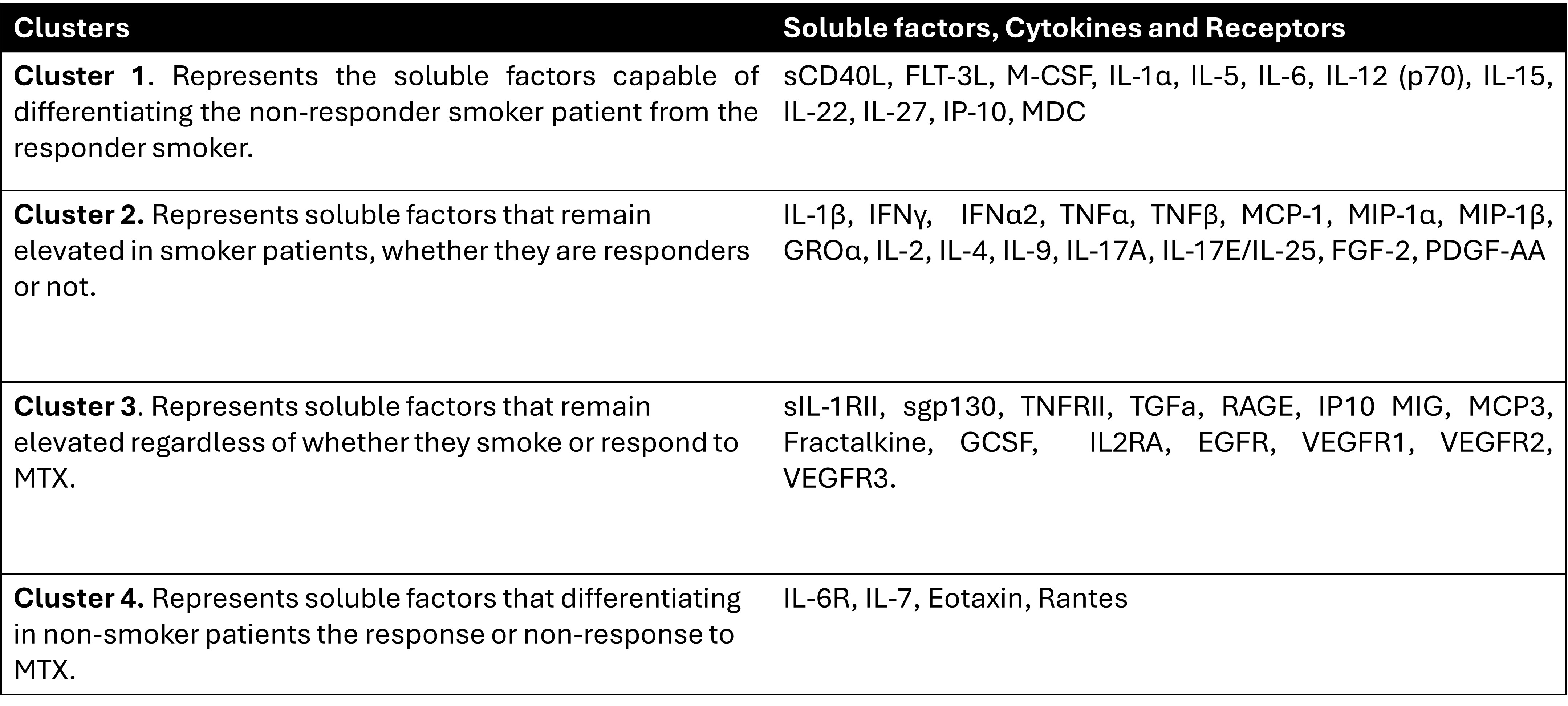Session Information
Session Type: Poster Session B
Session Time: 10:30AM-12:30PM
Background/Purpose: Rheumatoid arthritis (RA) is a highly inflammatory severe chronic autoimmune disorder with an inadequate activation of the immune cells. These cells are responsible for releasing large amounts of inflammatory cytokines, chemokines and soluble receptors directly involved in the pathophysiology and chronicity of RA. Methotrexate (MTX) is a commonly used Disease-modifying anti-rheumatic drugs (DMARD) in RA patients. Unfortunately, a relevant percent of these patients do not respond to MTX and need to initiate biological treatments. We are now able to measure a simultaneously huge number of soluble factors which could help us to understand the lack of response of patients to different treatments and their association with risk factors such as smoking. The potential role of these soluble factors in the MTX clinical response in early RA remains under discussion. The objective of this work is to study the behavior of 62 circulating soluble factors (table 1) in recently diagnosed DMARD naïve RA patients treated with MTX along the first 6 months of follow up according to their MTX response and, additionally, to the presence or absence of smoking.
Methods: Serum samples from 54 RA patients at 0, 3 and 6 months of MTX treatment and 24 healthy controls (HC) were obtained. The 62 circulating soluble factors were quantified by a luminex milliplex assay. Samples were tested in a Magpix® system and analyzed using the Analyst 5.1 software. The results were analyzed with SPSS29(IBM). Additionally, an unsupervised principal component analysis (PCA) was performed for identify different clusters.
Results: Firstly, we have analyzed which soluble factors are able to predict the lack of response of RA patients to MTX. Thus, non-responders to MTX present increased levels of IL6, IL12p70, sCD40L, TGFa, MCP1, IFNg, IL17A, IL17F and decreased levels of IL5, IL10 and RANTES at the beginning of treatment compared to responders (figure 1). Secondly, we have analyzed the behavior of soluble factors according to the response to MTX at 6 months. Non-responders presented elevated levels of IL18, IL-6R, CD40L, TGFA, IL8, IL17F and decreased RANTES compared to responders. Thirdly, we have analyzed the influence of smoking on the inflammatory condition of these patients, and whether it is related to the lack of response to MTX during the first 6 months. We have found significant differences that have allowed us to clustering the soluble factors into main four groups: a cluster that differentiates non-responder smoker from responder smoker patient, a cluster in which cytokines remain elevated in smoker patients, whether they are responders or not, other in which soluble factors remain elevated regardless of whether they smoke or respond to MTX, and a cluster that differentiates in non-smoker patients the response or non-response to MTX (table 2).
Conclusion: Soluble factors are able to predict whether or not the patient will respond to MTX and if they remain inflamed at 6 months. We have been able to differentiate soluble factors involved in the lack of response to MTX treatment due to smoking from those associated exclusively with the disease itself. The individualized study of altered soluble factors in RA-patients could help to perform a better precision treatment.
Disclosures: J. Monserrat: None; C. Bohorquez: None; A. Gómez: None; E. Rabadán Rubio: None; R. Sánchez: None; A. Movasat: None; L. Ruiz: None; F. Albarran Hernandez: None; M. Ortega: None; A. Perez: None; M. Alvarez-Mon: None.
To cite this abstract in AMA style:
Monserrat J, Bohorquez C, Gómez A, Rabadán Rubio E, Sánchez R, Movasat A, Ruiz L, Albarran Hernandez F, Ortega M, Perez A, Alvarez-Mon M. The Study of 62 Circulating Soluble Factors Is Able to Predict the Lack of Response to MTX Treatment in Recently Diagnosed DMARD Naïve Rheumatoid Arthritis Smoker and Non-Smoker Patients [abstract]. Arthritis Rheumatol. 2024; 76 (suppl 9). https://acrabstracts.org/abstract/the-study-of-62-circulating-soluble-factors-is-able-to-predict-the-lack-of-response-to-mtx-treatment-in-recently-diagnosed-dmard-naive-rheumatoid-arthritis-smoker-and-non-smoker-patients/. Accessed .« Back to ACR Convergence 2024
ACR Meeting Abstracts - https://acrabstracts.org/abstract/the-study-of-62-circulating-soluble-factors-is-able-to-predict-the-lack-of-response-to-mtx-treatment-in-recently-diagnosed-dmard-naive-rheumatoid-arthritis-smoker-and-non-smoker-patients/



